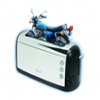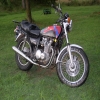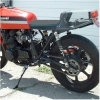Bullet connector crimpers.
- Dr Zed
-

- Offline
- User
-

Registered
- Posts: 91
- Thanks: 1
Re: Bullet connector crimpers.
25 Oct 2007 00:26
otakar wrote:Thanks otakar, so impressed, I have already ordered a kit from vintageconnections, like some of the other guys I also solder all my wire ends.
BTW otakar my background is Airforce Aeronautical Engineer.
Tony



BTW otakar my background is Airforce Aeronautical Engineer.
Tony
Please Log in or Create an account to join the conversation.
- otakar
-

- Offline
- User
-

Registered
- Posts: 5073
- Thanks: 29
Re: Bullet connector crimpers.
25 Oct 2007 04:31
One trick I use for all connectors is; That I strip the end twice as long as required and than double it up on itself for all wires which will allow. This gives more mass in the crimp and pulling the crimp out is impossible. The wire will brake before the crimp pulls out. I do not like to solder my connections because the solder wicks up the wire strands and than the wire can brake at the edge of the solder joint. With these bullet connectors and the provided jackets for them, there is excellent wire stress relief and I find that to do the crimp is easier than a solder joint and heat-shrink. If you go threw all of the catalog pages at Vintage Connections (almost sounds like a retro porn sight), one will find that they have almost every tipe of connector required for a complete restoration job.
Otto
Otto
74 Z1-A stock
76 KZ-900 Totaly stock vice MAC pipe
77 KZ-1000A stock
78 Z1-R 100%MINT 500 original Mi.
78 Z1-R Yoshi 1103 kit stage 1 cams Yoshi pipe. Etc
79 KZ-1300 (1400)
80 KZ-1300
81 Scratch built GPz1150R
82 KZ1000
76 KZ-900 Totaly stock vice MAC pipe
77 KZ-1000A stock
78 Z1-R 100%MINT 500 original Mi.
78 Z1-R Yoshi 1103 kit stage 1 cams Yoshi pipe. Etc
79 KZ-1300 (1400)
80 KZ-1300
81 Scratch built GPz1150R
82 KZ1000
Please Log in or Create an account to join the conversation.
- wiredgeorge
-

- Offline
- User
-

Registered
- Posts: 5298
- Thanks: 45
Re: Bullet connector crimpers.
25 Oct 2007 07:11
Sometimes soldering is impractical if an electrical device is going to be unhooked... This is why Kaw used bullet connectors to connect the coils, rear brake light switch and the reg/rec white and white/red (and sometimes brown) wires, etc. If you use crimp bullet connectors, it makes a LOT of sense to use the connectors like sold by Z1 or the ones Otakar used as opposed to the ones you can buy in Walmart.
If you do use the connectors Wally (or an autoparts store) sells, tin the conductor before crimping and then heat the tinned wire so that it flows and this will greatly aid keeping the wire from coming loose in the future.
When doing a refurbish on a wiring harness, the multipin connectors sold by Z1E or the place Otakar uses would be FAR better (by a zillion times) than the DC connectors from Radio Shack. I have used those things with their install tool and they are not solid. The OEM style connectors are FAR more solid especially if you break down and buy the install tool. I think the #1 electrical issue on almost all bikes I work on is the OLD multi-pin connectors; those off the switchgear to main-harness and the one in the headlight from the ignition switch in particular and the one from the stator to regulator (or reg/rec). If you bought one of these kits and used new multi-pin connectors, you could probably avoid MANY of the electrical demons many write about here... also use contact cleaner on the connectors and dielectric grease and forget about them...
If you do use the connectors Wally (or an autoparts store) sells, tin the conductor before crimping and then heat the tinned wire so that it flows and this will greatly aid keeping the wire from coming loose in the future.
When doing a refurbish on a wiring harness, the multipin connectors sold by Z1E or the place Otakar uses would be FAR better (by a zillion times) than the DC connectors from Radio Shack. I have used those things with their install tool and they are not solid. The OEM style connectors are FAR more solid especially if you break down and buy the install tool. I think the #1 electrical issue on almost all bikes I work on is the OLD multi-pin connectors; those off the switchgear to main-harness and the one in the headlight from the ignition switch in particular and the one from the stator to regulator (or reg/rec). If you bought one of these kits and used new multi-pin connectors, you could probably avoid MANY of the electrical demons many write about here... also use contact cleaner on the connectors and dielectric grease and forget about them...
wiredgeorge Motorcycle Carburetors
Mico TX
www.wgcarbs.com
Too many bikes to list!
Mico TX
www.wgcarbs.com
Too many bikes to list!
Please Log in or Create an account to join the conversation.
- howard8414
-
- Offline
- User
-

Registered
- Posts: 12
- Thanks: 0
Re: Bullet connector crimpers.
25 Oct 2007 13:21
on my relay bypass project I used the cheapie connectors but I crimped and soldered the wire to the connector. Then I put some heat shrink over the plastic end of the conection back about 1" onto the wire.
It's secure and nicely sealed.
It's secure and nicely sealed.
Please Log in or Create an account to join the conversation.
- darmahsd
-
- Offline
- User
-

Registered
- Posts: 81
- Thanks: 0
Re: Bullet connector crimpers.
28 Oct 2007 20:00
I ditto what otakar says about solder connections. I believed in solder until I started seeing many connections broken off by the inherent brittleness of the solder joint. Not practical on vibrating motorcycles exposed to the elements. I do the same as in doubling over the wire when I have a connector bigger than the gauge I'm using. I take another step and dip the wire in dielectric silicone greese, then shrink tubing if not using shrink connectors. A good crimp means the wire will never slip out because of the grease. I never had one fail.
Stephen
Stephen
Please Log in or Create an account to join the conversation.
- Biquetoast
-

- Offline
- User
-

Registered
- King Jeremy The Wicked
- Posts: 1193
- Thanks: 7
Re: Bullet connector crimpers.
28 Oct 2007 20:20
darmahsd wrote:
I'm not a soldering Nazi, but I do solder alot. I use a nice hot solder, with a tight joint, with thick heat-shrink, and usually an additional black-tape wrap for support. I still use bullets... sometimes.. in the headlight for the various connections in there.. I hate them though...
The only joints I've ever had break on me (in my short biking lifetime) is a coil power stock bullet connector that came apart (I assume from vibration), and some of the dash light power wires inside the harness right at the crimp, and a bunch of grounds that broke right at their crimps (likely due to age/corrosion). These are the reasons I have developed an aversion to crimps... Never had a solder fail on me yet, in my situation, in my climate, etc...
I hear what you guys are saying....I believed in solder until I started seeing many connections broken off by the inherent brittleness of the solder joint. Not practical on vibrating motorcycles exposed to the elements...
I'm not a soldering Nazi, but I do solder alot. I use a nice hot solder, with a tight joint, with thick heat-shrink, and usually an additional black-tape wrap for support. I still use bullets... sometimes.. in the headlight for the various connections in there.. I hate them though...
The only joints I've ever had break on me (in my short biking lifetime) is a coil power stock bullet connector that came apart (I assume from vibration), and some of the dash light power wires inside the harness right at the crimp, and a bunch of grounds that broke right at their crimps (likely due to age/corrosion). These are the reasons I have developed an aversion to crimps... Never had a solder fail on me yet, in my situation, in my climate, etc...
(1.) '75/'76 KZ400D - Commuter
(2.) '78 KZ750B3 Twin - Commuter
(3.) '78 KZ750B3 Twin - Commuter
(4.) '75 KZ400D - Sold
kz750twins.com
(2.) '78 KZ750B3 Twin - Commuter
(3.) '78 KZ750B3 Twin - Commuter
(4.) '75 KZ400D - Sold
kz750twins.com
Please Log in or Create an account to join the conversation.
- jjdwoodman
-

- Offline
- User
-

Registered
- Live free, or die.
- Posts: 376
- Thanks: 1
Re: Bullet connector crimpers.
28 Oct 2007 23:12
All comes down to what works for you, but really we should all be well versed in using both types of connection. (solder and crimp) It's kind of like saying bolts can come loose so I'll just weld my head on!
They both have their proper place, and the real ticket to good success is knowing which one to use in your particular application.
One note on the soldering being brittle. If you have a proper solder joint, the solder should not wick up the wire more than 1/4 to 1/2 inch and that should be covered by an additional 1/2 inch of heat shrink on each side which helps support the wire. Never had one break on me yet on anything.
And ditto on the good connectors... it is possible to find good connectors with heat shrink fittings at auto supplies, but that's got to be the best set I've seen, and a mighty fine looking job I might add.

They both have their proper place, and the real ticket to good success is knowing which one to use in your particular application.
One note on the soldering being brittle. If you have a proper solder joint, the solder should not wick up the wire more than 1/4 to 1/2 inch and that should be covered by an additional 1/2 inch of heat shrink on each side which helps support the wire. Never had one break on me yet on anything.
And ditto on the good connectors... it is possible to find good connectors with heat shrink fittings at auto supplies, but that's got to be the best set I've seen, and a mighty fine looking job I might add.
77 650b
81 550 Mostly there
83 ZN1300 Voyager
81 550 Mostly there
83 ZN1300 Voyager
Please Log in or Create an account to join the conversation.
- loudhvx
-

- Offline
- KZr Legend
-

Registered
- Posts: 10863
- Thanks: 1622
Re: Bullet connector crimpers.
28 Oct 2007 23:18
Solder has its place, but I do most wiring connections with:
www.harborfreight.com/cpi/ctaf/Category....oryID=166&pricetype=
It does a great job with the cheap connectors available at most stores. With any other crimper, those cheap connectors are junk. With this crimper, the cheap connectors are as good as factory connectors. In my opinion, anything less is a waste of time and money.
These make life easier:
www.harborfreight.com/cpi/ctaf/Displayitem.taf?itemnumber=42101
especially when you are trying to re-wire an entire KZ400 from scratch in 4 hours. I haven't tried these exact strippers, but some facsimile thereof.
Post edited by: loudhvx, at: 2007/10/29 02:25
www.harborfreight.com/cpi/ctaf/Category....oryID=166&pricetype=
It does a great job with the cheap connectors available at most stores. With any other crimper, those cheap connectors are junk. With this crimper, the cheap connectors are as good as factory connectors. In my opinion, anything less is a waste of time and money.
These make life easier:
www.harborfreight.com/cpi/ctaf/Displayitem.taf?itemnumber=42101
especially when you are trying to re-wire an entire KZ400 from scratch in 4 hours. I haven't tried these exact strippers, but some facsimile thereof.
Post edited by: loudhvx, at: 2007/10/29 02:25
1981 KZ550 D1 gpz.
Kz550 valve train warning.
Other links.
Kz550 valve train warning.
Other links.
Please Log in or Create an account to join the conversation.
- jjdwoodman
-

- Offline
- User
-

Registered
- Live free, or die.
- Posts: 376
- Thanks: 1
Re: Bullet connector crimpers.
28 Oct 2007 23:50
Hey Lou, If I may pick your brain...
I like those crimpers, but in my work, I've had problems with the non-water tight connectors. Especially in places like under trailers or cars where road grime always seems to corrode the connection between the crimp and the wire. I've had better luck if I fill the connector with dielectric, but still not perfect success. How do you address that issue, or do you reserve those type connectors for semi protected areas?
I extend my deepest respect to you, you have a way of explaining things with a clarity that I envy.
Thanks
Joshua
I like those crimpers, but in my work, I've had problems with the non-water tight connectors. Especially in places like under trailers or cars where road grime always seems to corrode the connection between the crimp and the wire. I've had better luck if I fill the connector with dielectric, but still not perfect success. How do you address that issue, or do you reserve those type connectors for semi protected areas?
I extend my deepest respect to you, you have a way of explaining things with a clarity that I envy.
Thanks
Joshua
77 650b
81 550 Mostly there
83 ZN1300 Voyager
81 550 Mostly there
83 ZN1300 Voyager
Please Log in or Create an account to join the conversation.
- steell
-

- Offline
- User
-

Registered
- Posts: 6849
- Thanks: 208
Re: Bullet connector crimpers.
29 Oct 2007 06:13
Ever try heat shrink crimp connectors? That's what we use on semi tractors and trailers.
And Lou, you surprised me! I expected you to use at least a Klein crimp tool!
(That's what I use on the job).
Post edited by: steell, at: 2007/10/29 09:15
And Lou, you surprised me! I expected you to use at least a Klein crimp tool!

(That's what I use on the job).
Post edited by: steell, at: 2007/10/29 09:15
KD9JUR
Please Log in or Create an account to join the conversation.
- jjdwoodman
-

- Offline
- User
-

Registered
- Live free, or die.
- Posts: 376
- Thanks: 1
Re: Bullet connector crimpers.
29 Oct 2007 07:08
The heat shrink connectors are what I call the "good" connectors that you can get from parts stores. I like them very much, but they're a little spendy. That's why I was wondering about the super cheapos. If they can be used in the rough places without crapping out, it would save money, but I just can't justify spending half a day cutting out all the scotch locks from a trailer, just to have the brakes or lights not work again in 6 months.:blink:
77 650b
81 550 Mostly there
83 ZN1300 Voyager
81 550 Mostly there
83 ZN1300 Voyager
Please Log in or Create an account to join the conversation.
- loudhvx
-

- Offline
- KZr Legend
-

Registered
- Posts: 10863
- Thanks: 1622
Re: Bullet connector crimpers.
29 Oct 2007 10:54
steell wrote:
If I can get one for $10...
The ratcheting one I use is very similar to the ones I used when I used to wire diesel-locomotive control systems. Also, the "cheap" connectors are nearly the same ones used on the diesels. (But would be inside the cab, not exposed to water, maybe oil, but not water.)
Thanks Joshua!
I keep my wiring to a minimum and most of the connections are high-up under the tank. I believe the tank is best place to keep things dry, as long as they can take the heat. I keep my turn-relay circuits under there too.
I only ride in a drenching rain a few times a year and in the dozen years since I re-wired my oldest bike, I haven't had any water-related electrical problems yet. After a rain, the cheap connectors dry out pretty quickly if I keep riding when it stops raining.
I think the real problem is if a bike is stored out in the weather, then much more needs to be done to keep the connections dry. Probably the best thing would be modern automotive connectors, with their multiple rubber seals etc., but they are so bulky I wouldn't be able to use them. The heat-shrink connectors help keep water out, like Steell mentioned, but cost a little more.
The best thing, obviously, is to get the bike out of the weather, otherwise plan on it being a basket case in a few years.
I will say I never use dielectric grease for any electrical contacts. I have worked on many bikes which appeared to have wiring in perfect shape, but they would have multiple problems due to too much dielectric grease. The grease is an insulator. If it gets onto the contacts, it reduces the surface area for current and there is usually a voltage drop associated there. These bikes usually end up as nightmares since many connectors need to be cleaned very thoroughly or at the worst cut off. The grease also seems to attract dirt which is not very pretty.
I don't know if it's because the grease should only be used on super-tight connectors, or if too much was used, or what. I know many people use it with no problem, but it drives me crazy when trouble-shooting because the initial assumptions are that if the wires and connectors look good, they must be passing current. It takes a while before you can narrow an intermittent charging problem down to one single connector, or worse, several connectors. The natural assumption is that it's a stator or regulator etc. etc.
I fix a lot of bikes, mostly for electrical problems, and they are the type of bikes that cost more to fix than they are worth, unless you keep it as low-budget as possible. I've re-wired many bikes using the cheap crimp contacts (but only with that ratcheting tool and the automatic stripper), and the wiring has always outlasted the bikes.
As for tips..., really the skill of stripping wires and soldering come with experience, but the most important thing is to keep things organized and neat. Wires shouldn't dangle much at all. Cutting wire to the right length is critical. That means cutting with just enough extra so it's not going to interfere with the layout, but will have a little so the wire never has to "stretch". The wires should never be under stress, support any weight, or be pinched too tight by tie wraps. When you run a bundle of wires they should run in parallel lines so they look like a ribbon-cable. Any crossovers should be kept to a minimum... this takes a lot of planning.
Post edited by: loudhvx, at: 2007/10/29 14:00
Ever try heat shrink crimp connectors? That's what we use on semi tractors and trailers.
And Lou, you surprised me! I expected you to use at least a Klein crimp tool!
(That's what I use on the job).
If I can get one for $10...

The ratcheting one I use is very similar to the ones I used when I used to wire diesel-locomotive control systems. Also, the "cheap" connectors are nearly the same ones used on the diesels. (But would be inside the cab, not exposed to water, maybe oil, but not water.)
Thanks Joshua!
I keep my wiring to a minimum and most of the connections are high-up under the tank. I believe the tank is best place to keep things dry, as long as they can take the heat. I keep my turn-relay circuits under there too.
I only ride in a drenching rain a few times a year and in the dozen years since I re-wired my oldest bike, I haven't had any water-related electrical problems yet. After a rain, the cheap connectors dry out pretty quickly if I keep riding when it stops raining.
I think the real problem is if a bike is stored out in the weather, then much more needs to be done to keep the connections dry. Probably the best thing would be modern automotive connectors, with their multiple rubber seals etc., but they are so bulky I wouldn't be able to use them. The heat-shrink connectors help keep water out, like Steell mentioned, but cost a little more.
The best thing, obviously, is to get the bike out of the weather, otherwise plan on it being a basket case in a few years.
I will say I never use dielectric grease for any electrical contacts. I have worked on many bikes which appeared to have wiring in perfect shape, but they would have multiple problems due to too much dielectric grease. The grease is an insulator. If it gets onto the contacts, it reduces the surface area for current and there is usually a voltage drop associated there. These bikes usually end up as nightmares since many connectors need to be cleaned very thoroughly or at the worst cut off. The grease also seems to attract dirt which is not very pretty.
I don't know if it's because the grease should only be used on super-tight connectors, or if too much was used, or what. I know many people use it with no problem, but it drives me crazy when trouble-shooting because the initial assumptions are that if the wires and connectors look good, they must be passing current. It takes a while before you can narrow an intermittent charging problem down to one single connector, or worse, several connectors. The natural assumption is that it's a stator or regulator etc. etc.
I fix a lot of bikes, mostly for electrical problems, and they are the type of bikes that cost more to fix than they are worth, unless you keep it as low-budget as possible. I've re-wired many bikes using the cheap crimp contacts (but only with that ratcheting tool and the automatic stripper), and the wiring has always outlasted the bikes.
As for tips..., really the skill of stripping wires and soldering come with experience, but the most important thing is to keep things organized and neat. Wires shouldn't dangle much at all. Cutting wire to the right length is critical. That means cutting with just enough extra so it's not going to interfere with the layout, but will have a little so the wire never has to "stretch". The wires should never be under stress, support any weight, or be pinched too tight by tie wraps. When you run a bundle of wires they should run in parallel lines so they look like a ribbon-cable. Any crossovers should be kept to a minimum... this takes a lot of planning.
Post edited by: loudhvx, at: 2007/10/29 14:00
1981 KZ550 D1 gpz.
Kz550 valve train warning.
Other links.
Kz550 valve train warning.
Other links.
Please Log in or Create an account to join the conversation.
Moderators: Street Fighter LTD


